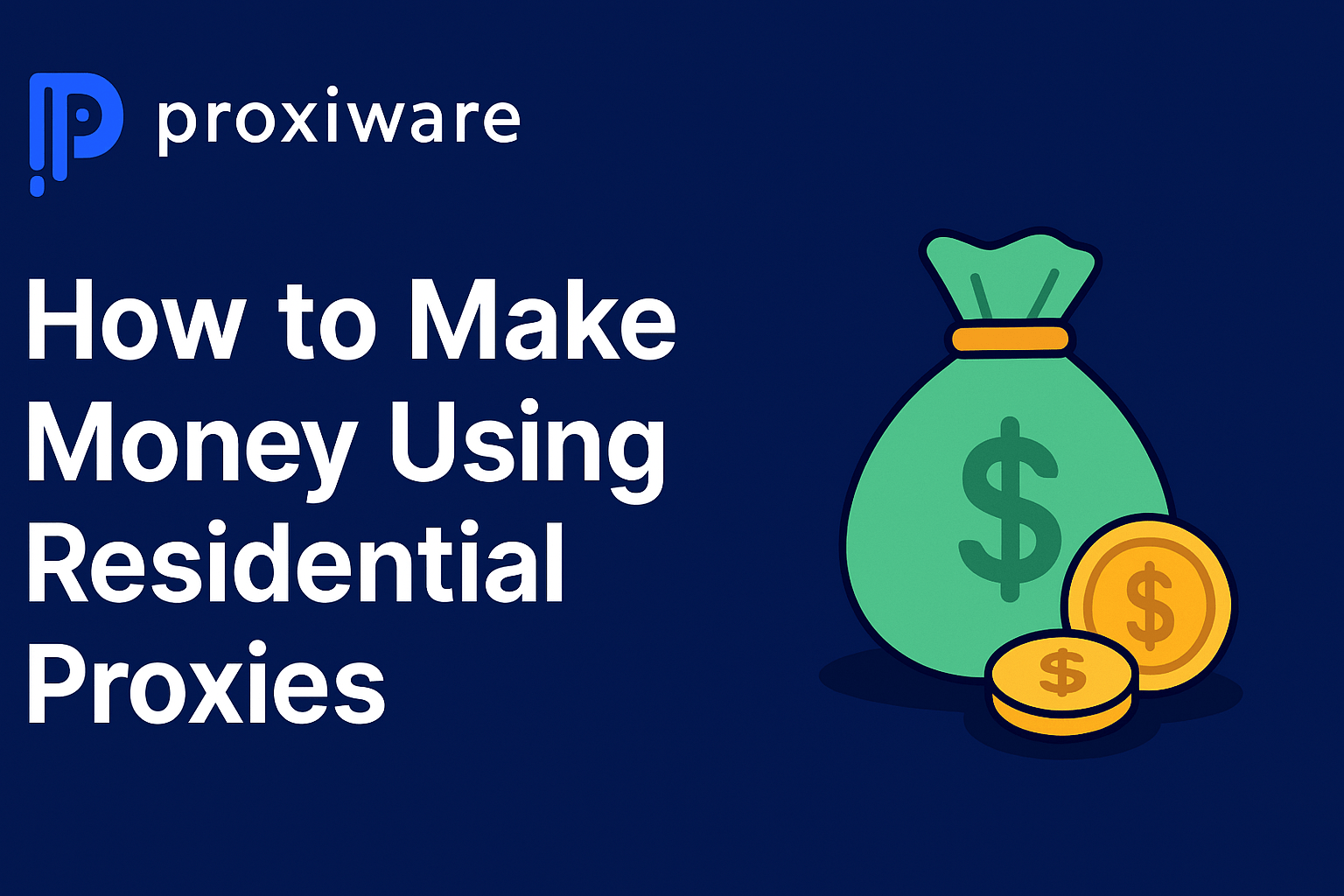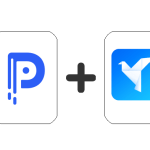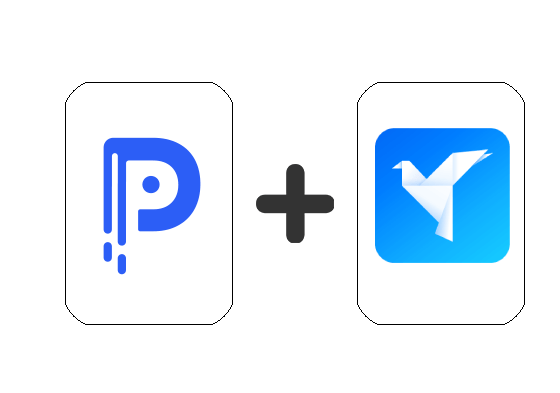
How to Make Money Using Residential Proxies: 8 Hidden Hustles
Residential proxies are proxy servers that use IP addresses assigned by ISPs to real homes, making your traffic look like it’s coming from a regular household. In other words, sites see you as a legitimate local user, not a data center or VPN. And that “real user” disguise can open up some surprisingly profitable side hustles that most people overlook. By masking your identity and letting you appear from almost any location, residential proxies give you a serious edge in various online money-making schemes. Below, we dive into 8 proxy-powered hustles – beyond the mainstream – and how you can cash in on each.
1. Sneaker Resale Bots – Flipping Limited-Edition Kicks
The Hustle: Sneaker resale is a billion-dollar game, where rare drops of Jordans, Yeezys, and other limited-edition sneakers sell out in seconds and resell for hefty profits. Using sneaker bots, hustlers automate the buying process to snag multiple pairs at retail, then flip them on resale marketplaces for a big markup. It’s like high-speed retail arbitrage: cop fast, then cash in on the hype.
Why Proxies Give an Edge: Popular sneaker sites (Nike, Adidas, Supreme, etc.) fiercely defend against bots. They often allow only one purchase per IP and will quickly ban known datacenter IPs. This is where residential proxies are the secret sauce – they make your bot blend in as a real customer. These proxies use connections of actual people, and sneaker sites don’t want to ban real shoppers, so they’re far more reluctant to block you. With rotating residential IPs, you can run multiple bot instances, each on a different household IP, to bypass purchase limits and avoid IP-based bans. In short, proxies let you scale up, increasing your chances to snag dozens of pairs instead of just one. Good for: Tech-savvy sneakerheads who know the sneaker culture and aren’t afraid to tinker with bots and automation for a payoff.
2. Travel Fare Arbitrage – Geo-Based Flight & Hotel Deals
The Hustle: Ever notice how flight or hotel prices change based on where you’re searching from? Travel fare arbitrageurs exploit this by using proxies to spoof their location and score cheaper bookings, then profit off the difference. For example, a hustler might find a flight ticket that’s significantly cheaper when booked from a country like India or Mexico, purchase it via that location, and resell it (or book for clients) at a higher price in the U.S. market. Others use this method to run travel affiliate sites or agencies, pocketing the savings or earning commissions on “impossible” low fares they uncover.
Why Proxies Give an Edge: Location is everything here. Airlines and travel sites use dynamic pricing based on your IP location. The same ticket can cost drastically less in another country – in fact, economy fares can run 10–40% lower in places like Turkey or India compared to high-income countries. Residential proxies let you instantly appear as if you’re browsing from those cheaper regions. By rotating through IPs in various countries, you can compare prices worldwide and nab the lowest fare every time. Proxies also help avoid getting flagged or rate-limited by travel sites as you repeatedly search and refresh for deals across different locales. Good for: Travel hackers and entrepreneurial nomads who love finding loopholes in the system. If you have a thing for finding deals and maybe running a travel blog or service, this hustle rewards your globetrotting mindset.
3. Social Media Account Farming – Creating & Selling “Aged” Accounts
The Hustle: This hustle is all about quantity in the social media game. It involves creating large batches of social media accounts (think Instagram, Facebook, Twitter, TikTok, etc.), “warming” them up by making them look real (posting, engaging slowly over time), and then either using them for marketing or selling them to other marketers. Why? Businesses and influencers often need aged, trustworthy accounts for campaigns (or to run multiple ad accounts without limits). There’s a whole underground market for verified or aged social accounts. By farming them, a side-hustler can cash in by selling each account or renting out a batch for a campaign.
Why Proxies Give an Edge: Nearly all social platforms ban multiple accounts from one person – they’ll flag you if you try to run, say, 20 Instagram accounts on the same IP. Residential proxies are vital here: they let you assign a unique real-home IP to each account, so to the platform it looks like each profile is a different person in a different household. Most detection happens via IP tracking; proxies with “sticky” sessions (keeping the same IP for each account) make it possible to manage dozens of accounts without linking them. Plus, residential IPs come from normal devices, so your accounts appear as regular users, not bots. This dramatically reduces captcha challenges and bans. With proxies, you can safely automate account creation and management at scale – essential when you’re farming 100+ socials. Good for: Social media mavens with a bit of a hacker streak. If you understand social algorithms, have patience for managing multiple personas, and don’t mind operating in a gray area of platform policy, this hustle can turn your spare time into social currency and real cash.
4. Ticket Scalping with Location Spoofing – Score Seats & Resell for Profit
The Hustle: Ticket scalping has been around forever (buy tickets low, sell high), but proxies take it next-level. Modern scalpers use bots + proxies to buy large quantities of in-demand concert or sports tickets the instant they drop. They might also target region-locked sales – for example, an artist might release tickets only to residents of a certain city or country in a pre-sale. A hustler with proxies can pose as local buyers everywhere and scoop up those tickets. After securing a stash of seats at face value, they turn around and resell them on secondary markets (StubHub, etc.) for a hefty profit once the event sells out.
Why Proxies Give an Edge: Ticketing sites like Ticketmaster have strict anti-bot and anti-resale measures. If one IP makes too many purchase attempts, it’s going to get banned. They also impose geo-restrictions – for instance, blocking purchases from outside a venue’s region. Residential proxies help defeat both obstacles. By rotating through many IP addresses, you avoid triggering rate limits or IP bans for high-volume buying. You can also choose IPs in specific cities to access local sales that would normally be off-limits. These proxy IPs mask your bot’s activity to look human and spread it across different “identities,” making it much harder for the ticketing site to detect the scalping operation. In short, proxies let you be everywhere at once: one moment you’re “in New York” buying Broadway seats, the next you’re “in London” snagging West End tickets – all from your couch. Good for: Hardcore event enthusiasts or entrepreneurs who understand fan demand. If you have quick reflexes, don’t panic under pressure, and can invest in bots/proxies upfront, you can turn ticket hunting into a lucrative hustle (and maybe even attend a few shows on the house).
5. Lead Generation Scraping – Turning Data into Dollars
The Hustle: In B2B and B2C marketing, leads = money. This hustle involves using web scraping tools to gather massive lists of leads (like emails, phone numbers, or business contact info) from various websites, then selling that data or using it to drive sales. For example, you might scrape business directories or social sites for contact info of thousands of companies and sell those leads to recruiting firms or B2B sales teams. Or scrape real estate listings, job postings, etc., and package that data for clients. Essentially, you act as a data broker – collecting valuable public info at scale and monetizing it.
Why Proxies Give an Edge: Web scraping on a large scale quickly runs into roadblocks – many websites will detect and block a single IP making tons of requests. Residential proxies are the go-to solution for serious scrapers, avoiding blocks and captchas by rotating IPs and blending in with normal traffic. Because these IPs appear as real users, scrapers using residential proxies can crawl target sites without getting throttled. In fact, using web scraping together with residential proxies is considered one of the most optimal ways to generate leads today. You can gather data from anywhere in the world by choosing proxy locations, which is great if you need, say, a list of restaurants in Paris or plumbers in Chicago. The proxies keep you anonymous and unblocked while you harvest the info. Once you have the data, you can sell the lead lists or charge clients for “lead generation” services. Good for: Coders or data-savvy hustlers. If you’re handy with Python, scraping tools, or even no-code scraping services – and you have a nose for what data is valuable to businesses – this path lets you monetize your data-mining skills. (Pro tip: a bit of sales savvy to actually sell the leads will boost your earnings here.)
6. Affiliate Marketing & Cloaking – Testing Offers in Every Geo
The Hustle: Affiliate marketers earn commissions by driving traffic to offers (like products, app installs, etc.). The gray-hat twist here is using proxies to cloak and test affiliate funnels. “Cloaking” means showing one thing to ad networks or regulators (a compliant landing page), while redirecting real users to a more aggressive or non-compliant offer page. Proxies help affiliates see exactly what users in different regions see and ensure their cloaking setups work. Additionally, affiliates often run multiple ad accounts or campaigns across regions – proxies enable that multi-account operation without getting banned. In practice, a hustler might run a weight-loss supplement offer on Facebook ads; they’ll cloak the ad reviewer to see a harmless blog page, but real users get sent to a high-converting sales page. They’ll use proxies to simulate various locations (to test country-specific offers) and to manage many accounts safely.
Why Proxies Give an Edge: This game is all about staying under the radar and accessing geo-specific content. Residential proxies let an affiliate marketer appear as a normal user in any given country, which is crucial for testing how an offer flows in that locale or checking if the cloaking is working (e.g., see the “real” landing page that a US user would see versus what a European user sees). Top affiliates use armies of proxies to monitor their own ads and funnels across 150+ countries, effectively mimicking users in each region. Proxies also help avoid account bans – using high-quality residential IPs for each ad account prevents platforms from linking your accounts together, so you can run multiple campaigns in parallel. In the world of affiliate marketing, being able to spy and test worldwide is a massive advantage. As one proxy provider notes, with millions of IPs at your disposal, you can see region-locked ads and “pose as a real residential visitor” to any site. This means you won’t miss a profitable offer just because it’s shown only to, say, German users – you can experience and optimize every funnel first-hand. Good for: Hustlers who know digital marketing and aren’t afraid of the dark arts of advertising. If you’re analytical, love tweaking ads for different audiences, and comfortable operating in a cloak-and-dagger fashion to beat the competition, proxies will be your best friend in affiliate campaigns.
7. Local SEO Spoofing – Fake GMB Listings for Lead Gen
The Hustle: This is a “rank and rent” style hustle. You create fake or unstaffed business listings on Google Maps (Google My Business profiles) for services that get a lot of local searches – think locksmiths, plumbers, car towing, etc. These listings are essentially lead funnels: when a person finds your fake “ABC Locksmith – Dallas” and calls, you redirect that call to an actual locksmith and charge them for the lead (or you take a commission if a job comes through). By populating many regions with your own dummy listings, you capture leads that would otherwise go to real local businesses. It’s spammy and against Google’s guidelines (to be clear!), but it’s happening at scale – Google even sued a network of scammers for making thousands of fake listings to sell user leads. If done smartly, you can build a whole lead generation empire without any real storefront. You rank the listing or get it visible in local searches, then sell the incoming inquiries to legit businesses.
Why Proxies Give an Edge: Google’s systems try to prevent one person from creating a ton of GMB listings, especially in places they’re not physically located. Residential proxies help you fly under the radar by making each listing action originate from a local IP address. For instance, when setting up a fake profile for “Plumber Chicago”, you’d use a proxy with an IP in Chicago, so to Google it looks like a local user or agency managing that listing. This increases your success rate for verification calls or postcards and reduces suspicion. Proxies also let you manage multiple Google accounts for multiple listings without linking them together (similar to the social account farming logic). In short, proxies enable the scale in this operation – you can be virtually present in dozens of cities at once. Moreover, if you’re scraping Google search results or maps data to gauge where to deploy your next fake listing, proxies help there too by allowing high-volume queries without getting blocked. Good for: Local SEO geeks and lead gen entrepreneurs. If you understand SEO ranking factors, enjoy creating/optimizing listings or websites, and have a bit of a scrappy, growth hacker mentality, you can turn free Google traffic into a steady stream of paying leads. It’s a hustle for the bold, willing to operate in a gray zone for high rewards.
8. App & Service Sign-Up Farming – Maxing Out Referrals and Freebies
The Hustle: Companies often offer juicy referral bonuses or free trial periods to attract new users – free ride credits, discount coupons, even cash bonuses for signing up friends. Sign-up farmers take advantage by creating hundreds of accounts to claim these incentives over and over. This can range from benign (e.g. farming free cloud storage by making many accounts and combining the space) to more profit-driven (e.g. signing up for dozens of fintech apps that give $10-$20 per referral and essentially referring yourself to rack up rewards). Another angle is farming accounts that have value themselves: for instance, creating and aging email accounts or streaming service trials and selling them in bulk to people who don’t want to register themselves. Essentially, it’s about manufacturing “new users” at scale to exploit promotions or create digital goods (accounts) that you can sell.
Why Proxies Give an Edge: The biggest hurdle in multi-account farming is that companies limit one account per user/IP/device. If you try to make 50 accounts from your home network, you’ll get flagged and banned quickly. Proxies solve this by assigning a fresh residential IP to each account, making each account look like it’s coming from a different person and location. Combine proxies with an antidetect browser (to mask device fingerprints) and you have a powerful setup for bulk registrations. For example, farmers who created thousands of Google or Facebook accounts absolutely rely on residential or mobile proxies to succeed – each IP appears as a unique new user in the target service’s eyes. With proxies, you can also target geo-specific promos (e.g. an app that gives a bonus only for sign-ups from Canada – just use Canadian IP proxies to collect those). In practice, you might run scripts or bots to automate the sign-ups, cycling through a list of proxy IPs for each new account. This way, Account #1 looks like it came from Texas, Account #2 from California, #3 from Germany, and so on – all real residential footprints. Many referral hackers have done this to get unlimited ride-share credits or earn thousands in sign-up bounties. Residential IPs make it believable and prevent the giveaway that one person is behind the curtain. Good for: Detail-oriented hustlers who love gaming the system. If you’re the type who had multiple email addresses as a kid to get free trials repeatedly, and you’re organized enough to handle lots of credentials, this is your playground. Some basic scripting or automation skill goes a long way here, but even manual grinders can do it with enough patience and proxy power.
Wrapping Up: Turn Proxies into Profit
By now you can see that residential proxies are more than just privacy tools – they’re like skeleton keys unlocking hidden income streams on the internet. Each of the hustles above takes a bit of know-how and a hustler’s mentality, but they share a common theme: proxies give you access and scale that the average user simply doesn’t have. Whether it’s buying limited goods in bulk, accessing price disparities, automating accounts, or simulating an entire network of “you” around the world, this tech can be your unfair advantage.
The difference between a small-time side gig and a serious operation often comes down to how effectively you can scale up, and that’s exactly what proxies empower you to do. Of course, with great power comes the need for savvy: you’ll have to learn the ropes, adapt to challenges, and stay one step ahead (after all, if it were too easy, everyone would do it). But for someone with grit and creativity, these proxy-enabled hustles offer very real paths to making money on your own terms.
So, pick a hustle that fits your style and skills, fire up those proxies, and get to work. The beauty of it is that most people won’t put in the effort to figure these out – but you’re not “most people,” are you? Now you’re armed with insider knowledge and a toolkit to match. It’s time to tap into those hidden income streams and turn your online hustle into a cash flow. Good luck, and happy hustling!
Related Posts
The Evolution of Hotjar in the Proxies-Digital Domain
This article explores the evolution of Hotjar, a leading all-in-one…
Troubleshooting Common Problems with Rotating Mobile Proxies
This blog post aims to guide users through the process…







